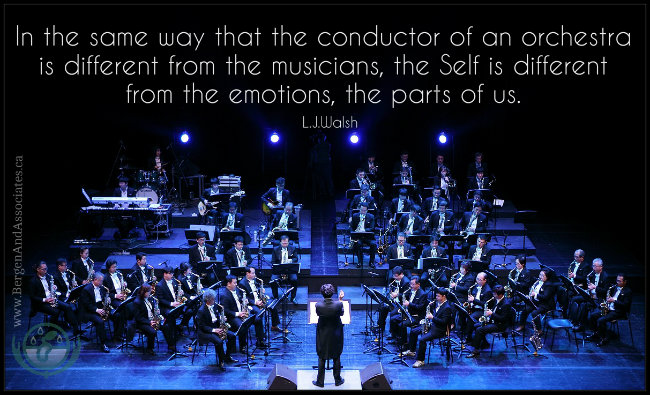While Carolyn is away on vacation, Lindsey Walsh steps in again to respond to questions about emotional parts and how they interact with each other…
After reading recent blog posts, my friend Alejandra e-mailed me the following question:
“While y’all are talking about Inside Out, can anyone please explain to me what should I make of Mom’s “Chief Emotion” being Sadness? […] Is this meant to be “contentment”?”
Thanks Alejandra! This is a vital question.
The short answer is: Inside Out, treats our Inner Worlds like an orchestra without a conductor.
Like children in a home with no nurturing adult.
Like you without YOU.
And sometimes we do feel that way. Sometimes we experience our emotions like kids without caregivers.
And most of us can agree that those are the hard times.
Luckily, the kids are not actually in charge. Or, if they are today, they don’t need to be tomorrow.
One of the most influential Family Therapists (and a hero of mine), Richard Schwartz, puts it this way:
“Everyone has a Self that is different from the parts [emotions]. [Self] is the place from which a person observes, experiences, and interacts with the parts and with other people.”
Just like a conductor has a different role from the musicians in an orchestra, my Self (Soul or Spirit) is different from my emotions, or what Schwartz and others call our “parts”.
You’ve maybe even said things like, “A part of me gets so angry when she says that.” Or, “A part of me feels so small when he treats me that way.”
That’s exactly it!
That’s the key idea that we forget sometimes: There is a “me” and there are the “parts of me”. There is my “Self” and there is my Anger, my Sadness, my Fear, my Disgust.
In the same way that the conductor of an orchestra is different from the musicians, the Self is different from the emotions, the parts of us. Self has a role and a responsibility to see the whole picture and to act with centredness, courage, compassion, and creativity.

Just as a cellist is not responsible for the tempo the trombone plays at, it is not my Fear’s job to soothe me. My Fear has one job: To alert me to real and potential danger and to protect me and those around me from danger.
That’s it.
I cannot – and should not – rely on Fear to nurture my child or listen to my wife’s day at work.
Fear cannot nurture.
And though Fear can listen, the sort of listening it does is partial at best. You know this from experience.
Fear cannot nurture or listen with empathy. These are not his jobs and, when he tries to do these jobs, things go poorly.
Very, very poorly.
Fear’s job is to remind me that my son GOT TO THE TOP OF THE KITCHEN STOOL AND IS LOOKING WOBBLY!!!
In short, Fear is a vital player, a valuable member of the team.
Fear is not a conductor.
Children need caregivers; orchestras need conductors.
Just as it is always my job to nurture my son, to provide him with love and guidance, to demonstrate respect and love for his mother and our family,
it is always my job to nurture my emotions. To appreciate my emotions. To learn from them.
But to never be led by them.
My emotions are the players in my orchestra. When they trust me to lead, we can make harmonious and beautiful music. When I leave the podium – chaos!
My emotions are the children in my inner-family.
And I am their father. When I can listen to, hold and soothe my own deep emotions–that is when they help me lead a rich life. That is when I can truly be in with my family and friends and clients. Then I can be compassionate and courageous enough to love my family and to serve my community with all my heart.
Then I can be me.






Write a Comment